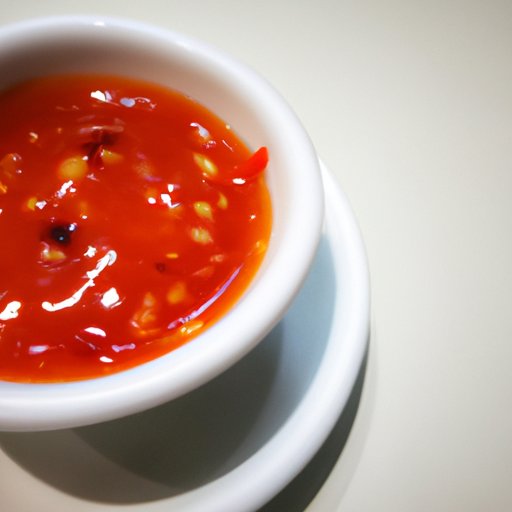Introduction
From tacos to wings, hot sauce is a popular condiment that adds a kick of flavor to many dishes. But what exactly is hot sauce? Hot sauce is a spicy condiment made from chili peppers, vinegar, and other ingredients such as garlic, onion, and spices. It can range in spiciness from mild to extra hot, depending on the type of pepper used and the amount of heat added.
But aside from adding a flavorful punch to your food, is hot sauce healthy? In this article, we’ll explore the potential health benefits of hot sauce, as well as any risks associated with eating too much of it. We’ll also look at the science behind hot sauce and its health effects.

Exploring the Health Benefits of Hot Sauce
When it comes to the health benefits of hot sauce, there are a few things to consider. First, let’s look at the nutrition value. Hot sauce is low in calories, fat, and carbohydrates, making it an ideal addition to many diets. It also contains vitamins A and C, potassium, and iron. Depending on the type of hot sauce, it may also contain probiotics and fiber.
In terms of potential benefits for weight loss, hot sauce may help boost metabolism and reduce appetite. Studies have shown that capsaicin, the active ingredient in chili peppers, can increase metabolic rate and decrease hunger. Additionally, research suggests that adding hot sauce to meals can help reduce overall calorie intake.
Hot sauce also offers antioxidant and anti-inflammatory properties. The active ingredient in chili peppers, capsaicin, has been found to reduce inflammation in the body, which can help protect against certain diseases. Hot sauce also contains lycopene, which is a powerful antioxidant that helps fight free radicals and protect cells from damage.
Is Hot Sauce Good or Bad for You?
While hot sauce does offer some potential health benefits, it’s important to consider the risks associated with eating too much of it. One of the main concerns is the level of spiciness. Eating too much hot sauce can cause stomach upset and heartburn, so it’s important to be mindful of how much you’re consuming.
Another concern is its impact on blood pressure. Eating too much hot sauce can raise your blood pressure, so it’s important to consume it in moderation if you have hypertension. Additionally, people who are sensitive to spicy foods or have allergies or intolerances should avoid eating hot sauce.
The Science Behind Hot Sauce and its Health Effects
Now let’s take a closer look at the science behind hot sauce and its health effects. As mentioned earlier, the active ingredient in chili peppers is capsaicin. Studies have found that capsaicin can provide a range of health benefits, including pain relief, improved digestion, and reduced risk of cancer.
Capsaicin can also have a positive effect on digestive health. Research suggests that it may help reduce symptoms of irritable bowel syndrome (IBS) and other gastrointestinal issues. Additionally, studies have found that capsaicin can help lower cholesterol levels, which can reduce the risk of heart disease.
Hot Sauce: A Healthy Addition to Your Diet?
So, is hot sauce a healthy addition to your diet? While it does offer some potential health benefits, it’s important to consume it in moderation. Too much hot sauce can lead to stomach upset, heartburn, and other unpleasant side effects.
If you want to incorporate hot sauce into your diet, here are a few tips: start with milder sauces and work your way up to hotter varieties; use it as an accent flavor rather than the main flavor of a dish; and opt for natural hot sauces that don’t contain added sugar or preservatives.
If you’re looking for alternatives to hot sauce, there are plenty of options. You can try adding fresh herbs and spices to your dishes for a flavorful kick, or opt for a milder condiment like salsa or pesto.

Benefits of Hot Sauce: What the Research Says
To sum up, hot sauce has a range of potential health benefits, from aiding weight loss to providing antioxidants and anti-inflammatory properties. However, it’s important to consume it in moderation, as too much can lead to unpleasant side effects. Additionally, those with allergies or intolerances should avoid eating hot sauce.
Overall, the research on the health benefits of hot sauce is promising. A number of studies have found that capsaicin can provide a range of health benefits, from reducing inflammation to lowering cholesterol levels. However, the majority of these studies have been conducted on animals, so more research is needed to confirm the potential health benefits of hot sauce in humans.
At the end of the day, hot sauce can be a healthy addition to your diet, as long as you consume it in moderation. Adding a few dashes of hot sauce to your dishes can add a flavorful punch without overloading on calories or fat.
Conclusion
In conclusion, hot sauce offers a range of potential health benefits, from aiding weight loss to providing antioxidants and anti-inflammatory properties. However, it’s important to consume it in moderation, as too much can lead to unpleasant side effects. Additionally, those with allergies or intolerances should avoid eating hot sauce. The research on the health benefits of hot sauce is encouraging, but more research is needed to confirm its potential health benefits in humans.
(Note: Is this article not meeting your expectations? Do you have knowledge or insights to share? Unlock new opportunities and expand your reach by joining our authors team. Click Registration to join us and share your expertise with our readers.)
